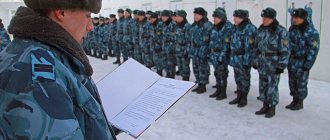The Criminal Code of the Russian Federation provides for several types of punishment and detention in a penitentiary institution. One of these is a colony settlement. If we compare this type of detention of convicts with a prison or colony, then the first can be called the most favorable option, since the conditions are as close as possible to everyday life.
What a settlement colony is, and what things convicts can take there with them - we will consider these questions in more detail below.
List of permitted food products
Correctional institutions have strict requirements for products provided to convicts. Therefore, when assembling a transfer, you should pay attention not only to WHAT you put, but also HOW.
In accordance with SanPiN, convicts can be given baked goods: rye bread, wheat bread, baked goods without fillers. It is important that the products remain in their original packaging from the manufacturer, or must be cut into pieces and placed in a plastic bag.
Cereals, pasta and any products that require heat treatment are prohibited, so the best option is soups, noodles and instant mashed potatoes. Quick lunches can be left in sealed packaging from the manufacturer, but it is better to stock up on plastic bags in case you need to unwrap them.
Seasonings, bouillon cubes, mustard and ketchup are allowed to be transferred to prisons; their contents usually do not raise questions, but it makes sense to unwrap the bouillon cubes in advance and put them in a separate plastic bag.
Raw smoked, smoked, boiled-smoked sausages are allowed for transfer, but during the warm period from April to October only raw smoked sausage can be transferred. The products must be in sealed packaging from the manufacturer, but during inspection they may be asked to be cut into pieces. Salted and smoked lard, hard cheese packaged in sealed packaging, and cold smoked fish in vacuum packaging are also allowed. It is important to know that fish are accepted only from October to April.
The same situation is with butter: it is allowed, but only from October to April, and no more than one package (250g). Margarine is taken in packaged containers; for vegetable oil, you must use substitute containers (not glass).
For delivery, sweets must be unwrapped and placed in a plastic bag. Chocolate, marmalade, cookies, kozinaki can be left in the original packaging from the manufacturer, or transferred to plastic bags. Honey is allowed, but it must be stored in a transparent, non-glass container that must be tightly closed.
As for tea, coffee, cocoa, these products can and even should be added to the transfer, the main thing is that they are in hermetically sealed packaging, and the tea is in packs. Sugar is accepted, but only refined sugar. You can put condensed milk, but in a separate packaged container and definitely not home-made.
Anything that does not require additional heat treatment is allowed from vegetables: onions, garlic, radishes, carrots, cucumbers, tomatoes. Vegetables should be washed, dry and placed in plastic bags. Among the fruits allowed for transfer are apples, pears, tangerines, oranges, lemons, and grapefruits. All fruits should also be washed, dry and placed in plastic bags.
If you wish, you can add dried fruits to the transfer: raisins, peeled nuts, dried apricots, figs, bananas, prunes in packages from the manufacturer, or in separate plastic bags.
The transfer of baby food is not prohibited. These can be meat, fruit, vegetable purees, juices, dry milk mixtures in packaging from the manufacturer.
As you can see, the main requirement for products is either complete packaging from the manufacturer or transparent bags. During inspection, PS employees pay great attention to the contents of parcels in order to avoid the transfer of prohibited items to the MLS. Another important point is that glassware and food contained in cans are not accepted for safety reasons.
If you want to pamper your relative with something delicious, give him plenty of good tea, coffee, sweets (so much so that you can’t eat them all at once), cigarettes, cervelat, onions, garlic and spices - these are the products that are most valued in MLS.
Also, to prevent part of the collected parcel from being returned to you, do not place products that have been stored for less than 72 hours and require heat treatment: cereals, meat, fish, semi-finished products; also products that require storage conditions at a temperature of 4 +/- 2 degrees. Pickles, jams and canned food are also prohibited (the only exception is colony settlements, where prisoners are kept in conditions closest to civilian life).
It is important that the transferred items and products comply with general requirements and the law, otherwise, at best, you will receive part of your transfer back, and at worst, you may be subject to administrative or criminal liability for illegal actions.
Remember, all of the above requirements for food products exist primarily to preserve the health of the convicts themselves.
What is recommended to put in the transfer?
Experienced relatives of convicts advise putting the following things in transfers to general, strict and special regime colonies.
From hygiene items
- Soap. In addition to the usual one, it is worth passing on tar, which destroys insects.
- Razor.
- Toothbrush
- Toothpaste.
- Shampoo - and you need to be prepared that you will be asked to pour it into a plastic bag.
- Toilet paper, sanitary pads, wipes (both wet and dry).
- Washcloth.
- Deodorant (preferably roll-on).
From food
Here it is worth remembering that you cannot transfer products that require heat treatment and homemade pickles (see the list of prohibited items).
You shouldn’t hand over perishable food – refrigerators are not available everywhere. Experienced people also advise stocking up on transparent plastic bags (in case, during the inspection, the colony staff asks you to put the food you brought into them), as well as a large bag or sack in which the parcel will be delivered to the prisoner.
What can you take with you?
What can you take with you to a settlement colony? This question is probably asked by every convict. We will consider this question in more detail below. According to the Criminal Code of the Russian Federation, a convicted person can take with him (or receive by parcel or parcel post) the following:
- Clothes, warm things.
- Personal hygiene items.
- Non-perishable products.
- Books, notebooks and other supplies that you may need for studying.
- Bed linen and similar accessories (towels, blankets).
- Money, valuable things.
Medications that contain drugs, alcohol, mobile phones, weapons and the like are prohibited.
In general, it is better to first clarify the list of what is permissible and what is strictly prohibited with the administration of the penitentiary institution, so as not to inadvertently get a violation.
What is "transfer"?
This is a food, clothing or combined kit collected for transfer or forwarding to a pre-trial detention center, prison or colony to a person under investigation or convict.
Such a parcel received the name “transfer” according to the criminal tradition of awarding diminutive names for things, events, etc., associated with the criminal world or characteristic only of it.
The collection of donations is most often carried out by a relative who wants to support a loved one who is deprived of liberty. But it is not prohibited to send parcels from people who are not related to the recipient.
Let's now look at what is possible when transferring to prison, and what is absolutely not allowed. Watch the video about being sent to prison:
Terms of serving the sentence here
The following conditions apply in the settlement colony:
- The prisoners are not monitored by guards: all prisoners can move freely around the territory of the institution. They are also allowed to visit neighboring settlements, if there are any, and if there is an agreement between the colony and the village.
- There are no restrictions on receiving parcels: however, there is an exception - you cannot bring parcels into the territory of the colony that may contain items that provoke an antisocial lifestyle.
- The uniform is civilian: therefore, to the question: what to take with you to a colony settlement, the answer is simple: the usual style. It is believed that in this way those serving their sentences do not stand out from others, which helps them adapt more easily.
- Colonies are divided into genders: male, female, children.
- The administration can conduct a search at any time: if items that fall into the category of prohibited items are found, sanctions will be applied to the violator, up to and including transfer to a correctional colony.
- Regardless of the financial situation of the convicted person, he must work - it is work that must develop useful habits. All work is carried out in accordance with labor laws.
- In their free time from work, convicts can learn new professions - for this purpose there are educational institutions on the territory of the colony.
You can even live in a colony-settlement with your family. This is possible if the person has proven himself positively. Then he can live with his family in rented premises.
In such a situation, he will have to go to the colony at least 4 times a month and check in.
It is worth considering separately the question: is it possible to use a mobile phone? The answer is quite simple. Despite this freedom, prisoners are not allowed to use communication devices.
What is a colony settlement?
What is a colony-settlement for convicts is well described in Russian legislation.
By definition, this is a type of correctional institution in which those sentenced to imprisonment for crimes committed through negligence serve their sentences.
In addition, those who committed a crime for the first time can also end up in a colony-settlement, although only those who belong to the category of minor or moderate severity.
In Russia, such colonies are located mainly in the northern and eastern regions, where there are many forests.
The first prisons of this type appeared in Soviet Russia in 1963. Then they belonged to the category of correctional labor colonies and settlements.
In 2022, as before, in such correctional institutions there are mainly those who:
- Committed a crime through negligence and was sentenced for no more than 5 years.
- Positively characterized during detention and transferred from general and strict regime colonies.
Serving a sentence in a colony-settlement is assigned by the court based on the totality of the severity of the punishment and the evidence . Many are concerned about the question: what are the conditions of detention in such colonies.
Types of Colonies
There are two types of such penitentiary institutions:
- Gentle regime - those convicted who committed a crime through negligence, in a state of passion, and so on are sent there. Also, those who have committed a crime intentionally, but not more than average gravity, can be sent here.
- Settlements that are intended for prisoners serving a sentence for a moderate or serious offense, but who have earned such “mitigation” by their diligent behavior.
However, it should be noted that such divisions are conditional, and therefore exceptions are quite possible.
Have a question for a lawyer? Ask now, call and get a free consultation from leading lawyers in your city. We will answer your questions quickly and try to help with your specific case.
Telephone in Moscow and the Moscow region: +7
Phone in St. Petersburg and Leningrad region: +7
Responsibilities and restrictions of convicted persons
Naturally, with such a lenient punishment, all convicts have certain responsibilities and may also have their rights limited.
Duties include:
- Requesting permission to leave the correctional facility.
- Obligation to work - you can find a job on your own; prisoners provide all their living needs themselves.
- The need to hand over all your documents upon arrival to the leadership of the colony: everyone is issued a certificate, which replaces a passport and other documents while serving their sentence; it is used for employment, as well as for receiving postal items and even for marriage.
There are also a number of actions that prisoners are not allowed to perform. So, these include:
- Leaving the colony without permission from the colony leadership.
- Prohibition on bringing alcohol and drugs into the territory.
- Prohibition on carrying and storing weapons of any kind.
- Prisoners are not allowed to purchase their own vehicles.
- You cannot buy medications yourself without a doctor's prescription.
duty lawyer,
Convicted women with children in children's homes of correctional colonies may be allowed short-term travel outside the correctional institutions to place children with relatives or in an orphanage for up to fifteen days, not counting the time required for travel there and back, and convicted women having disabled minor children outside a correctional colony - one short-term trip per year to visit them for the same period.
Good afternoon Tell me, is it true that people from a penal colony can be allowed to go home for the weekend for good behavior?
Convicted women with children in children's homes of correctional colonies may be allowed short-term travel outside the correctional institutions to place children with relatives or in an orphanage for up to fifteen days, not counting the time required for travel there and back, and convicted women having disabled minor children outside a correctional colony - one short-term trip per year to visit them for the same period. 3. Travel on the grounds specified in parts one and two of this article are not permitted to convicted persons with particularly dangerous recidivism; convicts for whom the death penalty by way of pardon has been replaced by imprisonment; sentenced to life imprisonment; convicts suffering from an open form of tuberculosis; convicts who have not completed the full course of treatment for sexually transmitted diseases, alcoholism, substance abuse, drug addiction; HIV-infected prisoners, as well as in cases of anti-epidemic measures.
What items can be given to a convicted person?
Another important point that should be taken into account when collecting a parcel for a convicted person is what personal belongings can be transferred to the MLS. Similar information is set out in the order of the Ministry of Justice of the Russian Federation dated October 14, 2005 N 189.
Suspects and accused persons may receive in parcels and parcels:
- toiletries (soap, shampoo, toothbrush, toothpaste, cream, comb, comb);
- pocket mirror (if there is no mirror in the cell);
- razor (electric or mechanical, disposable);
- duffel bag or bag;
- glasses, crutches, wooden canes, prostheses (with a doctor’s permission);
- electric boiler;
- ballpoint pen, refills for it (black, purple, blue);
- a simple pencil, writing paper, student notebooks, postal envelopes, postcards, postage stamps;
- toilet paper issued or purchased in a store (stall).
The list of clothing permitted for transfer depends on the regime in which the prisoner is kept. In pre-trial detention centers and colony settlements, convicts are allowed to receive the following personal items: shirt, suit, trousers, dress, skirt, shorts, sweater, jacket, tracksuit or dressing gown for women, hat, summer hat, gloves, mittens, shoes, underwear no more than 4 sets (panties, socks, bra, T-shirt, stockings, tights, leggings).
In penal colonies of more stringent regimes, the transfer of clothing is prohibited, with the exception of one set of slippers, a tracksuit and sports shoes in dark colors (Order of the Ministry of Justice of the Russian Federation dated October 14, 2005 N 189; Order of the Ministry of Justice of Russia dated N 205).
Tobacco products in prisons are equivalent to money. Therefore, when collecting the package, it is worth storing several cartons of cigarettes. But there are requirements on how to prepare them for delivery: you need to remove the cigarettes from the packs and put them in a plastic bag.
Another important issue is medications. Medications can be transferred only with the prescription of a doctor in a pre-trial detention center or correctional facility. The need to use other medications recommended by specialists from other treatment and prevention institutions should also be confirmed by the doctor of the pre-trial detention center or correctional facility.
It is worth remembering that in MLS it is prohibited to have a personal phone, so all attempts to transfer such a gadget to a prisoner may result in administrative problems, primarily for the person making the transfer.
Another thing is televisions. Televisions are not prohibited items, nor are fans and refrigerators. However, before transporting equipment, it is worth writing a statement and checking with the head of the pre-trial detention center or correctional facility whether they are ready to accept such things.
With the transfer of literature to places of deprivation of liberty, things are not as simple as it might seem. To avoid extremist activity and the transmission of pornographic material, prisoners should use literature contained in local libraries or order books through the administration in a chain of stores.
Prisoners are allowed to have photographs among their personal belongings and to receive photographs during transfers.
For greater reliability of the information, we attach a list of things prohibited for transfer to MLS (Appendix No. 1, order of the Ministry of Justice of Russia dated No. 295).
- Items, products and substances withdrawn from civil circulation.
- All types of weapons, ammunition.
- Transport and aircraft.
- Explosive, poisonous, fire hazardous and radioactive substances, lighters.
- Money, valuables.
- Securities, currencies of foreign countries.
- Optical instruments.
- Food products that require heat treatment (except for tea and coffee, milk powder, instant food concentrates that do not require boiling or cooking), home-canned products, yeast.
- All types of alcoholic beverages, beer.
- Perfume, cologne and other alcohol-based products.
- Narcotic drugs, psychotropic toxic and potent substances, their analogues and without medical indications - medicinal substances, medical supplies, smoking mixtures.
- Electronic computers, typewriters, duplicating machines, electronic storage media and other computer and office equipment.
- Knives, straight razors, safety razor blades.
- Piercing and sharp-edged objects, including objects and containers made of glass, ceramics and metal (with the exception of aluminum spoons, forks, mugs, plates and canned foods in metal containers).
- Axes, hammers and other tools.
- Playing cards.
- Cameras, photographic materials, chemicals, film cameras, video, audio equipment (except for television receivers, public radio receivers), television receivers with access to the Internet information and telecommunications network and with built-in media players, electronic media and storage devices, mobile communications and communications equipment or components for them that ensure their operation.
- Any documents (except for documents of the established form, identifying the convicted person, copies of sentences and court rulings, responses based on the results of consideration of proposals, applications, petitions and complaints, receipts for money, things, valuables handed over for storage).
- Topographic maps, compasses, literature and educational videos on topography, service dog breeding, martial arts, training of special forces soldiers, mountain training and parkour, weapons design, production of explosive, poisonous, poisonous, narcotic and potent substances.
- Literature, documents or information on any media calling for extremist activities or justifying the need for such activities.
- Military and other uniforms, accessories.
- Clothing, hats, shoes and bedding (with the exception of one set of slippers, a tracksuit and sports shoes in dark colors) of unidentified samples.
- Pornographic materials, objects and videos.
- Tattoo machines and accessories.
- Electrical household appliances (except for electric shavers, factory-made household electric boilers with a power of no more than 0.5 kW).
- Things and objects, food products received or purchased in a manner not established by the Criminal Correctional Code of the Russian Federation and the Rules.
How to behave?
Procedures in different colonies may differ significantly, but general principles should be observed everywhere:
- At first, talk less and listen more, keep conclusions and value judgments to yourself.
- Do not talk about your personal and sexual life.
- Do not take on obligations without understanding their essence and price. In the case of valuable gifts, give something equivalent in return.
- Do not enter into conflicts, especially with representatives of the colony administration or with representatives of the “thieves’” authorities.
If a conflict arises with convicts, which may threaten health and life, you can contact the administration.
In this case, the convicted person will be transferred to solitary confinement to ensure his safety. Such a step, as a rule, is viewed negatively by other inhabitants of the colony, so it is better to try to resolve the conflict yourself. Otherwise, after being transferred to solitary confinement, the convicted person finds himself in social isolation for a long time, and returning to a normal environment is difficult until the very end of his sentence.
On our website you will find other useful materials telling about the rules and conditions of serving sentences in various correctional institutions. From them you can find out:
- What are the features of children's colonies for minors?
- How are sentences served in women's prisons?
- What you need to know about a general security prison?
- How does a maximum security colony differ from a general prison colony and others?
Question on the topic Behind bars
The act committed by your husband is a serious crime.
The term of imprisonment actually served by the convicted person cannot be less than six months.
Article 79 of the Criminal Code of the Russian Federation provides that a person serving imprisonment is subject to parole if the court recognizes that for his correction he does not need to fully serve the sentence imposed by the court. Is it possible to go to the dacha if you are under written recognizance not to leave? Parole can be applied only after the convicted person has actually served at least half of the sentence imposed for a serious crime; If you do not agree with the court’s decision, you believe that the sentence was passed in violation of your rights, the court’s conclusions contradict the actual circumstances of the case, send a complaint to the supervisory authority of the regional court.
If your complaint is not satisfied, you should appeal the refusal to the chairman of the regional court.
After arrival
Every person arriving in the colony is convicted:
- Goes through a thorough search and examination of things.
- Gives over the passport and other identification documents, instead receives a certificate of the established form.
- Undergoing a medical examination.
- Placed in quarantine for 10-15 days.
During a search, some personal belongings may be seized, in accordance with the subjective opinion of the searcher and regardless of what is written in the laws. You should request a receipt for receipt of the seized items at the storage warehouse, indicating their value. Subsequently, things can be passed on to relatives, or perhaps it will be possible to get something back for use.
During their stay in quarantine, convicts can be given various offers: accommodation in a “VIP hut” or a good job for some pay. Such services exist in some colonies, but you should not agree to any deals until you understand who you can conclude them with and who is just a scammer.
In many colonies, convicts are forced to “sign the 106th”: an agreement for free work on landscaping. By law, the administration does not have the right to force this, but it is often difficult to refuse.
Article 106 of the Penal Code of the Russian Federation. Involving prisoners sentenced to imprisonment in work without pay
- Persons sentenced to imprisonment may be involved without pay only in carrying out work to improve correctional institutions and adjacent areas.
- Convicts who are disabled people of the first or second group, convicted men over 60 years of age, convicted women over 55 years of age, and convicted pregnant women are involved in work without pay at their request.
- Convicts are involved in the specified work in order of priority in their free time, their duration should not exceed two hours a week. The duration of work can be increased upon the written application of the convicted person or, if urgent work is necessary, by a resolution of the head of the correctional institution.
After quarantine, convicts move into dormitories, which usually house several people per room. The rooms have all the necessary furniture, and may also have a refrigerator, kettle, stove, TV, depending on the administration’s policy. We talked in more detail about how convicts live in a colony-settlement here.
With a clear conscience
The quarantine is located on the second floor of a hut on chicken legs. There are five armored beds, a water cooler, an electric kettle, a wardrobe, dishes, and a TV. Something like a dorm at a university, only more comfortable.
Convicts spend the first ten days there - they are studied in depth by medical staff, and operatives monitor their behavior.
Next to the squad leader. He gave two receipts - on the criteria of behavior and “social elevators in the institution, on the involvement of convicts in work without pay (for landscaping the territory no more than two hours a week). I wrote one statement - that my whereabouts should not be reported to anyone. Otherwise, a statement is written where you can indicate people who would do well to inform.
I went outside and decided to quietly smoke on a bench and think about the situation. And then over the loudspeaker: “Convicted Kotlyar, appear...”. It gives me goosebumps. The pea soup was quite edible, but I couldn’t eat the oatmeal with meat.
It’s not like even eating it – he took a sip and spat it out. However, the convict who was delivering the food strongly recommended eating: “Dig inside - there’s a lot of meat there.” I moved into quarantine quickly and received a reprimand for not knowing how to make a bed. After what period can I apply for parole from a colony settlement? Well, I don’t know - as for me, it doesn’t seem to be lumpy.
who loves and waits for their other halves or brother and son from prison, I invite you to the site http: //www.lubluzeka.ucoz.ru/
I had a guy sitting there, telling me that he could even rent his own house and dates were not limited. I would like to be there with him, but I didn’t find that time. We met when he was already in general. One disadvantage of settling there is that it doesn’t work; if the period is long, it’s a big problem. Nowadays they don’t seem to sit there with the big ones. Listen, I'm so jealous of you. I'm still 2 years 8 months. We're hoping for success.
Is it possible to compare a colony settlement with a zone? - it’s like day and night, - it’s like the sun and the moon. COLONY SETTLEMENT IS SUCH A FUCK WHERE EVEN FAGOTS AND SLIMS MURR, SCREAMING THAT THEY ARE FUCKING DECENT. THERE ARE NO CONCEPTS THERE. AND ANY DECENT PRISONER, HAVING GOT THERE, WOULD GIVE THE PUSSY TO SOME ASSHOLE IN ORDER TO BE TRANSFERRED TO GENERAL SECURITY. SO IF YOUR FAVORITE IS THERE, I CAN SYMPATHATE. A friend was imprisoned in the Smolensk region, there were no violations, the settlement was assigned by the court. By the way, when you are released from a village on parole, there is another plus, in addition to everything else, they are released on the same day, you don’t have to wait 10 days.
So there you go.
Conditions of detention
Convicts live in dormitories with several people per room. Living conditions can vary greatly depending on the colony , usually the rooms have: beds on a metal frame with a mattress, a personal bedside table for each resident, a wardrobe for outerwear, a desk, chairs, a cabinet or shelves for food, a mirror, lamps, etc. It is possible to have a TV and a refrigerator. As a rule, settlers visit the bathhouse once a week.
On the territory of the colony there must be:
- Medical hospital.
- Shop.
- Bathhouse.
- School.
- Library.
- Assembly Hall.
- Rooms for receiving guests and sometimes hotels for them.
What are they?
Two types of colony-settlements are envisaged:
- for persons who have committed a crime through negligence and have been sentenced to a term of no more than 5 years;
- for positively characterized prisoners transferred from general and maximum security colonies.
Colonies can be male or female, or joint.
There are also colonies for minors. Read about how and where minors usually serve their sentences in Russia here.
Schedule
The daily routine depends on the internal regulations adopted in a particular colony . As a rule, it looks like this:
- Get up no later than 5-6 am. This is followed by physical exercise for 15 minutes. Another 10-15 minutes are given for the toilet and filling the beds.
- Morning check - up to 40 minutes.
- Breakfast - 30 minutes.
- The route to work and distribution of instructions is up to 1 hour.
- Working hours are 8 hours in accordance with the law, but labor rights are often violated and working hours can reach 10-14 hours a day.
- Lunch break - 30 minutes.
- Returning from work takes about half an hour.
- Dinner - 30 minutes.
- Educational activities - up to one hour.
- Free time - about an hour.
- Getting ready for bed - 15 minutes.
- Sleep - 8 hours.
Studying in educational institutions takes place according to a special schedule.
Nutrition
Each colony has a canteen, but the food served there leaves much to be desired. As a rule, these are porridges and soups made from cereals and substances resembling “compound fat”, which are classified as products of animal origin.
In the store you can buy your own products , such as: canned meat and fish, pickles (cucumbers and tomatoes), mixed vegetables, dairy products, cereals, pasta and instant noodles.
Dormitories may have kitchens. Depending on the administration's policy, stoves, kettles, pots and pans may be permitted for self-cooking.
An important place in the diet consists of products received through transmission from relatives.
More information about the nutrition of prisoners in the MLS can be found here.
Job
Colonies can be located near populated areas or right in the city. But more often they are found in the dense forests of the north and east of Russia.
In colonies remote from civilization, the choice of work is small : logging and woodworking are hard and dangerous work in unfavorable climatic conditions. It also happens that in such colonies there are much fewer jobs than there are colonists themselves, and in this case, work is a privilege that allows you to have a modest income and after some time count on parole.
In and around cities, work often involves tailoring. Also, with the permission of the administration, you can get a job in a locality nearby. It is unlikely that a convicted person will agree to be hired for a highly paid job, but this could be, for example, work in a factory, in the housing and communal services sector, in the agricultural sector or in the service sector. Since the uniform in the colony-settlement is loose, those around you may not understand that they are working together with the convict or receiving some kind of service from him.
Prisoners' labor rights are often violated:
- convicts work 12 hours a day;
- receive tiny salaries, from which payments for food and other services may be illegally collected;
- convicts are forced to “sign 106th” - that is, agree to free work to improve the territory of the colony.
Convicts are afraid to defend their rights, because otherwise they will face penalties, including a punishment cell: it is enough to “receive two punishment cells” for the colony administration to have grounds for transferring the convict to a general regime colony or denying him parole. It is very difficult to defeat the colony administration in court , and weighing all the risks, the majority of convicts prefer to put up with the violation of their rights.
It happens that after arriving in the colony they offer an appointment to a good position for a certain amount of money. This practice of purchasing positions does exist in some colonies. However, you should not agree to this without knowing who you are dealing with: they may deceive you.
Studies
According to paragraph 4 of Article 129 of the Penal Code of the Russian Federation, a convicted person has the right to receive secondary vocational and higher education, the form of education is correspondence. You can only enroll in educational institutions located in the same municipality as the colony.
Education is a good basis for incentives and subsequent parole , and the education received will be useful after release.
Entertainment and relaxation
In accordance with labor legislation, convicts are guaranteed an 8-hour working day and two days off, but these standards are often not respected, and colony residents do not have much free time.
Settlers have different options for spending their leisure time:
- On the territory of the colony there is a library and an assembly hall. There may also be a cinema and TV rooms.
- Various games are popular, such as backgammon, as well as card games, despite their formal ban.
- In case of good relations with the administration, it is possible to visit a nearby settlement.
- On holidays, it is customary to organize feasts, eating products received from the transfers. Sometimes settlers manage to smuggle in alcohol or buy it from the wardens. Some settlers even make mash on the territory of the colony, constructing ingenious hiding places for this.
Religion
The colonies are periodically visited by priests, and some even have chapels built ; in regions with a Muslim population, mosques can be found in the colonies. But problems may arise with performing namaz: although, according to the law, the colony administration does not have the right to interfere with religious rituals, in practice, strict adherence to the generally accepted regime is more important for the administration.
Dates and visits
Visits are an important part of a prisoner's life to maintain morale.
Settlers have the right to have visits without limiting their number. Small hotels for visiting relatives may be located on the territory of the settlement.
There is no limit on the number of dates only in KP. You can find out how short-term visits are conducted in institutions with other regimes in this article, and here we talked about the conditions for obtaining and holding long-term meetings with prisoners.
Transfer of products and things
Residents of the colony have the right to receive parcels and money transfers in any quantity.
applications for transfer to the IC
You will find more information about the rules for transfers to convicted persons in the MLS in a separate article.
Is it possible to wear long hair?
Women have the right to wear long hair , but many cut their hair short for convenience. It is not customary for men to wear long hair, although formal prohibitions or permissions depend on the internal regulations of the colony.
Using a mobile phone
Mobile phones are prohibited in all correctional institutions of the Russian Federation, which, however, does not prevent convicts from using them everywhere.
The severity of the ban depends on the policy of the administration , which in turn is caught between two fires: on the one hand, the storage and use of mobile phones is directly prohibited by law, on the other hand, if this ban is defended too harshly, convicts may begin to rebel, sabotage work and engage in sabotage.
As a rule, the administration builds a compromise policy in which periodic searches and seizures of mobile phones take place, but this does not happen very diligently and often, so settlers have the opportunity to use mobile phones, storing them in hiding places on the territory of the colony. Often the guards themselves are engaged in selling phones several times more than their retail price.
Is it possible to go home for the weekend?
The law states that convicts can leave the territory of the colony only “if it is necessary due to the nature of the work they perform or in connection with their studies,” that is, formally it is impossible to go home on the weekend . However, in many colonies it is possible to go home for the weekend if you have a good and trusting relationship with the leadership or for a certain amount of money.
At the same time, the law also states: “Convicts who do not commit violations of the established procedure for serving a sentence and who have families, by order of the head of the colony-settlement, may be allowed to live with their families in a rented or their own living space located within the boundaries of the colony-settlement or municipal entity , on whose territory the colony-settlement is located.”
Thus, if a convicted person’s house is located next to a colony, he has the opportunity to negotiate with the administration about living with his family.
Are hours allowed?
In a settlement colony it is allowed to wear a wristwatch, but in prisons and pre-trial detention centers - not.
Severe punishment or holiday camp?
Sentence to a penal colony is a relatively mild form of punishment available in Russian legislation. However, living conditions very much depend on the policies of a particular administration.
As a rule, prison inmates strive to be transferred to a colony-settlement, but it also happens that in some colonies such unbearable living conditions have been created that settlers are willing to deliberately violate the rules of the colony and even commit crimes in order to be transferred to other correctional institutions.
What features are there
What is the difference between a general regime colony and a settlement colony is a question of interest to those who face such punishment. As experts note, in essence, living in a colony-settlement is not a punishment at all.
This form of correctional work is more reminiscent of a shift in some wooded area or at wood processing enterprises.
There is no total control on the part of the colony leadership, and there are practically no guards.
In essence, the staff here is needed only to monitor how prisoners are trying to adapt socially, how they can lead a crime-free life, without exceeding the limits of what is permitted and generally accepted.
Features of correctional colonies (CP)
In correctional colonies of general, strict and ordinary regime, the maximum weight of the transfer should not exceed 50 kg. (based on clause 1 of article 90 of the Penal Code of the Russian Federation, which talks about “postal rules” - more details in clause 11.2 of the Procedure for the acceptance and delivery of internal registered mail (approved by order of the Federal State Unitary Enterprise "Russian Post" dated No. 114-p from the city "Ob approval of the Order").
As for the number of transfers, it directly depends on the severity of the regime in which the prisoner is kept. Let's briefly talk about the existing IR modes.
A colony-settlement is a correctional institution with the most “mild” conditions of detention. Here, convicts have a significant list of rights, they can wear civilian clothes, carry money and valuables and use them freely.
The same freedoms apply to transfers, parcels, parcels - in a colony-settlement there are no restrictions on the number of things transferred, as well as on everything related to how often they can be transferred (Article 129 of the Penal Code of the Russian Federation).
General mode
Things are different in regular regime correctional colonies. Depending on the severity of the crime committed and behavior, the convicted person may serve his sentence in ordinary, light or strict conditions of detention.
Under normal general regime conditions, a convicted person can receive 6 parcels or parcels and 6 parcels during the year. In light conditions of general regime - 12 parcels or packages and 12 parcels throughout the year. Under strict general regime conditions - 3 parcels or transfers and 3 parcels during the year. (Article 121 of the Penal Code of the Russian Federation)
You will find more information about the conditions for serving a sentence in a general regime penal colony in a separate article.
Strict
In maximum security correctional colonies there are also three conditions of detention, only here the situation becomes more severe.
In a strict regime penal colony under normal conditions of detention, a convicted person can receive 4 parcels or parcels and 4 parcels during the year. Lighter conditions of detention - 6 parcels or transfers and 6 parcels during the year. Strict conditions of detention - 2 parcels or transfers and 2 parcels. (Article 123 of the Penal Code of the Russian Federation)
Read about the conditions and rules of keeping prisoners in a maximum security penal colony here.
Special regime zones
The most stringent regime in a correctional colony is a special regime.
There are also 3 conditions of detention that make the life of prisoners easier or worse (strict). In a special regime prison under normal conditions of detention, a convicted person can receive 3 parcels or parcels and 3 parcels during the year. Lighter conditions of detention - 4 parcels or transfers and 4 parcels during the year. Strict conditions of detention - 1 parcel or transfer and 1 parcel. (Article 125 of the Penal Code of the Russian Federation)
More information about special mode IR can be found in a separate article.
blog_trepashkin
Legislatively, the release of convicts is enshrined in Article 97 of the Criminal Executive Code of the Russian Federation. I will give the full text of this article, which has an interesting title: “Article 97. Travel of persons sentenced to imprisonment outside correctional institutions1.
Those sentenced to imprisonment, held in correctional colonies and educational colonies, as well as convicts left in accordance with the established procedure in pre-trial detention centers and prisons to carry out housekeeping work, may be allowed to travel outside the correctional institutions: a) short-term trips lasting up to seven days, not counting the time required for travel there and back, due to exceptional personal circumstances (death or serious illness of a close relative that threatens the life of the patient; a natural disaster that caused significant material damage to the convicted person or his









